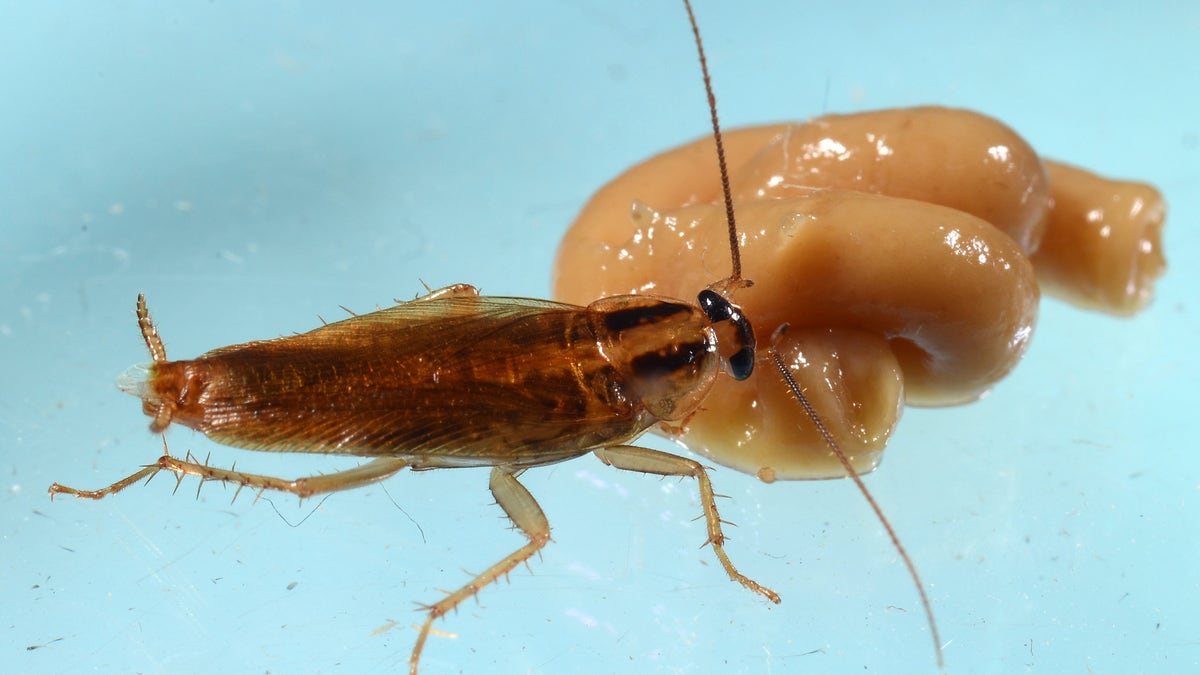Gross Video: worker finds dozens of dead cockroaches in old phone
A man in Australia was shocked when he took apart a broken wall-mounted telephone inside a home he was working on and discovered dozens of large cockroaches hiding inside.
Bad news for anyone afraid of creepy crawlies — scientists are warning that cockroaches are getting harder and harder to kill.
Researchers found that German cockroaches are becoming more difficult to eliminate because they are developing cross-resistance to insecticides.
The study, which was published in the journal Scientific Reports, was led by Purdue University professor Michael Scharf. The U.S. Department of Housing and Urban Development also supported the research.
“This is a previously unrealized challenge in cockroaches,” said Scharf in a statement. “Cockroaches developing resistance to multiple classes of insecticides at once will make controlling these pests almost impossible with chemicals alone.”

A German cockroach feeds on an insecticide in the lab portion of the Purdue University study. (Photo by John Obermeyer/Purdue Entomology)
Researchers note that different classes of insecticide work in different ways, with exterminators using a mixture of classes or changing classes from treatment to treatment. This approach aims to ensure that, even if a small percentage of roaches is resistant to one class of insecticide, insecticides from other classes will kill them.
The report’s authors tested this approach at multi-unit buildings in Indiana and Illinois over a six-month period. In one treatment, three different classes of insecticide were rotated each month for three months and then repeated. In the second treatment, researchers used a mixture of two insecticides from different classes for six months. In the third treatment group, experts picked an insecticide to which cockroaches had low-level starting resistance and used it for the duration of the research.
HOW COCKROACHES AVOID BECOMING ‘ZOMBIES’ DURING WASP ATTACKS
Cockroaches were also captured at each of the locations and lab-tested before the study began.
In the first treatment group, researchers kept the cockroach population flat, but could not reduce it. In the second group, where a mixture of two insecticides from different classes was used, the cockroach population flourished.
In one experiment with the single-resistance group, scientists found that there was little resistance to the chosen insecticide and researchers were able to all but eliminate the cockroach population. In another experiment with that group, however, about 10 percent of the cockroaches had starting resistance and the population grew.
CONSERVATION CENTER LETTING PEOPLE NAME COCKROACHES AFTER THEIR EX
The population growth was likely the result of cross-resistance, according to the study. “We would see resistance increase four- or six-fold in just one generation,” said Scharf. “We didn’t have a clue that something like that could happen this fast.”
Researchers note that female cockroaches have a three-month reproductive cycle during which they can have up to 50 offspring. “If even a small percentage of cockroaches is resistant to an insecticide, and those cockroaches gain cross-resistance, a population knocked down by a single treatment could explode again within months,” the statement explains.
The answer, according to Scharf, is an integrated pest management approach that combines chemical treatments, traps, improved sanitation and vacuums.
“Some of these methods are more expensive than using only insecticides, but if those insecticides aren’t going to control or eliminate a population, you’re just throwing money away,” Scharf said. “Combining several methods will be the most effective way to eliminate cockroaches.”
The study, which was also supported by the O.W. Rollins/Orkin endowment in the Purdue Department of Entomology, also found the problem of cockroach cross-resistance is particularly prevalent in urban areas and low-income or federally subsidized housing.
Last year, the genome of the American cockroach was sequenced for the very first time, revealing why the insect is such a tenacious survivor.
Follow James Rogers on Twitter @jamesjrogers









































